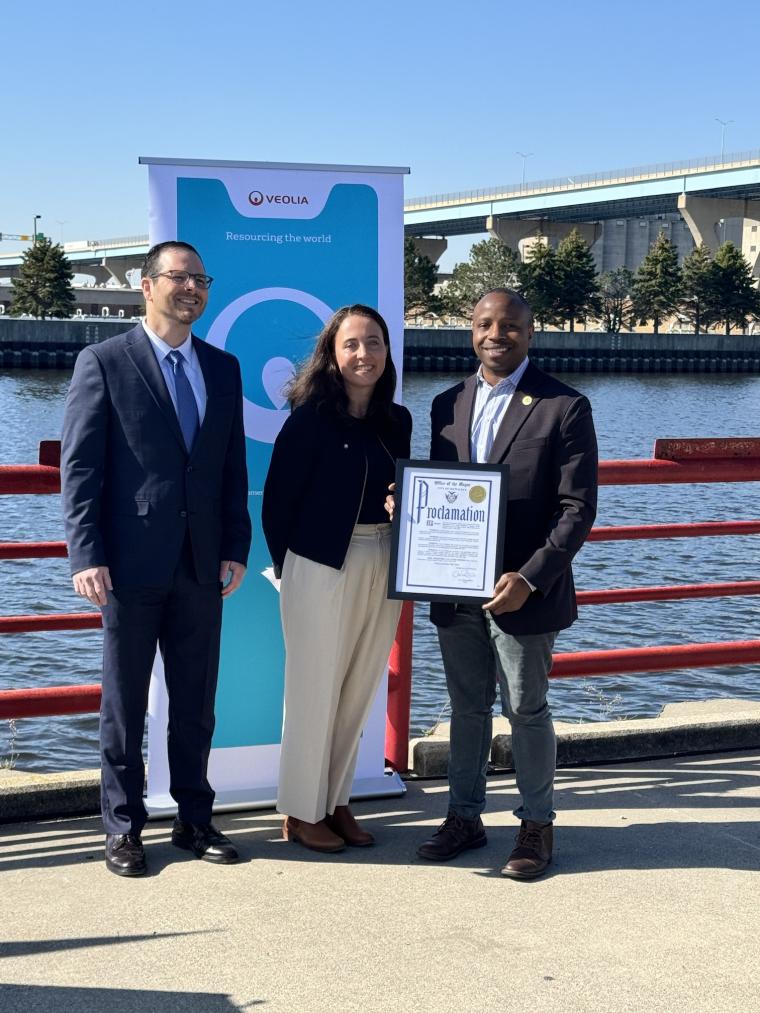
Veolia North America, the leading provider of environmental solutions in the U.S. and Canada, the Milwaukee Metropolitan Sewerage District (MMSD), and Milwaukee Mayor Cavalier Johnson marked the recent Earth Day by recognizing Milwaukee’s wastewater treatment infrastructure as an “Ecofactory,” marking its transformation from what was once a waste disposal process into a stream of green energy, resource recovery and environmental stewardship for greater Milwaukee.
The Ecofactory concept builds on MMSD’s leadership in treating wastewater as a valuable resource for nearly a century, bringing significant environmental benefits to the region such as producing Milorganite® fertilizer, turning gas byproducts into power sources and digesting waste to create energy while reducing landfill use. As the MMSD’s long standing operating partner, Veolia is designating Milwaukee as its first Ecofactory in America and will use its successes to inspire similar transformation in other cities across the country.
Karine Rougé, CEO of Veolia North America’s Municipal Water division, said, "Veolia is thrilled to partner with MMSD to launch the Ecofactory initiative in Milwaukee, a city that has long exemplified how to treat the environment responsibly and find creative ways to turn waste into resources. This collaboration represents a significant step forward in our shared commitment to sustainability and community engagement. By combining our expertise and resources, we can continue to create a more resilient and resourceful water infrastructure for Milwaukee and its residents, helping them cut carbon emissions, find value in wastewater and build stronger communities.”
“Forward-thinking actions are so important to meet the environmental and climate challenges we face,” Mayor Johnson said. “I am pleased Veolia is building on the work of MMSD as it advances the Ecofactory concept. And, I look forward to additional partnerships to advance our common goals.”
Kevin Shafer, Executive Director of the MMSD, said, “I could not be more humbled or proud to gather on this Earth Day to honor decades of innovation and the forward thinking that’s created a highly successful agency to protect public health and our source of drinking water, Lake Michigan.”
Ecofactory approach creates new environmental opportunities
Designating Milwaukee’s wastewater treatment system as an Ecofactory marks a significant achievement for the MMSD and a new approach in America for Veolia, which is working across the country to reimagine how wastewater treatment can benefit communities. As the top-ranked company for environmental services, Veolia intends to make the most of its global expertise to help America meet its need for sustainable growth. Last week, the group announced its ambition to double its size in the country by 2030.
An Ecofactory maximizes the value of the materials produced at a wastewater treatment system, such as reclaimed water used for agriculture or irrigation; waste heat or biogas used for energy; biosolids used for fertilizer; and even energy produced from on-site solar panels. An Ecofactory also optimizes those processes to operate as efficiently as possible, reducing greenhouse gas emissions, energy use and waste. And an Ecofactory consciously incorporates environmental and community stewardship from the start: Protecting biodiversity, strengthening climate resilience and creating new opportunities for green jobs and economic sustainability.
Veolia has pioneered the Ecofactory approach in other operating markets, working with existing systems to boost their benefits and transform their roles within communities. In Santiago, Chile, Veolia’s Ecofactory recovers 310 gigawatt-hours of energy from wastewater to eliminate waste, fossil energy and pollution from its treatment process. In Granada, Spain, all 4.8 billion gallons of wastewater treated at Veolia’s Ecofactory are reused for irrigation. With people across the planet demanding action to preserve the world’s resources and counter a changing climate, the Ecofactory framework is bringing practical solutions to the common challenges that communities face everywhere.
Milwaukee leads in treating wastewater as a resource
The MMSD has taken an innovative approach to wastewater treatment for nearly a century, adopting a then-novel European treatment process in 1925 that used microorganisms to feed on organic materials in wastewater and transformed them into Milorganite® fertilizer. Building on this impressive track record, Veolia and MMSD are exploring new opportunities to enhance Milwaukee's water infrastructure through the Ecofactory approach. Focusing on technical initiatives such as increased beneficial reuse, solar energy production and biogas generation, the Ecofactory partnership aims to maximize the regenerative and decarbonizing potential of wastewater treatment, such as expanding solar resources to help operate with 100 percent renewable energy by 2035.
Veolia and MMSD support community infrastructure
The Ecofactory initiative goes beyond technical advancements to recognize how the MMSD and Veolia have engaged deeply with Milwaukee's communities, neighborhoods and needs. Together they have focused on recruiting local workers from underrepresented areas of Milwaukee and are increasing efforts to support workforce grant initiatives, offer formal apprenticeships and increase access to Veolia’s internal workforce development program.
The environmental benefits of the partnership are also visible through initiatives that celebrate sustainability and biodiversity in the greater Milwaukee region, from its green infrastructure development to its aggressive goals to mitigate the effects of a changing climate. It includes the Lynyrd Skymmr boat that cruises Milwaukee’s waterways to skim floating debris from the surface and improve water quality in the rivers and harbor.
The Ecofactory in Milwaukee is set to become a model for sustainable water management and community involvement. Through this partnership, the city of Milwaukee, Veolia and MMSD aim to inspire other cities and organizations to adopt similar approaches, driving positive change and contributing to a more sustainable future.

There are no comments
Please login to post comments